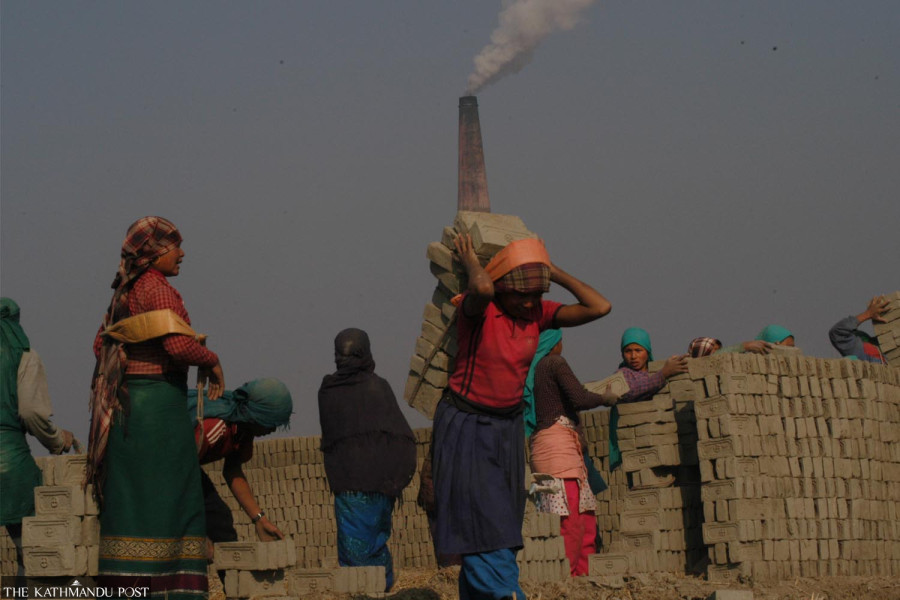Money
High costs, falling sales push brick kilns in Madhesh Province to the brink
The economic slowdown has led to the closure of 386 brick factories, 76,000 job losses.
Shiva Puri
Until a decade ago, brick chimneys rose above almost every village in the central Tarai, the lowland region in parts of southern Nepal bordering India.
The air was thick with smoke, trucks queued up for deliveries, and each kiln bustled with around 200 workers labouring late into the night. Brick factories had become a vital source of income for the poor.
However, these operations are shutting down due to an economic downturn, causing thousands of workers to lose their jobs, as construction activities slow down across the country.
Out of 700 brick factories established in the eight districts of Madhesh province, only 314 are currently operational.
According to the Federation of Nepal Brick Industries, Madhesh province, 386 brick factories have shut down in Madhesh alone since the Covid pandemic, resulting in nearly 76,000 job losses.
Among them, around 5,000 were workers from neighbouring India.
Mohan Sah, secretary of the Rautahat Brick Entrepreneurs Association, said multiple issues like halted brick sales, rising coal prices, damage from storms and hail, costlier bank loans, difficulties in collecting payments from credit sales and increasing labour and fuel costs are forcing the shutdown of brick factories.
He said if the government provided relief in hefty VAT and income tax, entrepreneurs would feel enormously relieved.
Sah runs the Ramjanaki Brick Industry, one of the largest kilns in the district, at Paltuwa in ward 5 of Gujara Municipality.
He has been in the business for 14 years and says the company was doing well until five years ago.
Traders used to come to the kiln to negotiate prices, and bricks used to sell for up to Rs12-13 per piece. Now, buyers are bargaining to pay just R8.50 per piece.
“After Covid hit, many of my fellow brick entrepreneurs had to shut down due to debt. Some even migrated to India,” he said. “If this continues, we too could fall into financial distress,” Sah said, adding that he has over Rs20 million combined loans from banks and locals.
Starting a modern kiln takes at least Rs10 million, and the total investment can go up to Rs50 million.
Before Covid, 140,000 workers were employed in brick factories across Madhesh, according to rough estimates.
Bikram Sah, president of Nepal Brick Industry Federation, Madhesh province, said 76,000 workers lost their jobs over the past five years. “When one factory closes, around 200 workers are affected. Across Madhesh, more than 76,000 have already lost their jobs,” he said.
“Who listens to the workers’ struggles?”
Entrepreneurs complain that they’re unable to sell bricks at a price that matches their investment.
In ward 5 of Shambhunath Municipality in Saptari, Durga Nanda Sah is a veteran in the brick industry. He has run the Shivashakti Brick Industry since 1997. Despite 27 years in business, the economic downturn has caused him significant stress.
Before Covid, he used to sell up to three million bricks in a season.
Encouraged by that success, he took out a loan of Rs30 million from Nepal Bank Limited in 2013, with Rs300,000 monthly interest payments, which he used to pay comfortably.
But after Covid, the business declined, and bricks stopped selling.
He sold bricks for Rs20 each; now, customers bargain for Rs12-13. “If this continues, there’s no option but to shut down. I can’t even pay the bank interest,” he said. “Last year’s unsold stock of three million bricks is still sitting there, and I’ve made another three million this year.”
Sah had planned to sell land to repay his loan but couldn’t. Land that once sold for Rs100,000 per kattha [338.63 sq metres] is now going for Rs40,000–50,000, yet there are no buyers.
According to entrepreneurs, it costs Rs8 to make a brick, and now they’re forced to sell it for that price. There used to be 166 brick factories operating in the district, but this year, only 42 remain in operation, according to the Rautahat Brick Industry Association.
The Best Brick Industry in Bhagwan Chowk, Rajpur Municipality, was once considered the best in the district but shut down two years ago due to the economic crisis.
Its operator, Sheikh Samirullah, said 200 workers became jobless due to the closure.
“When a factory closes, owners and workers face economic hardship,” he said. “There’s now no environment to run such businesses.”
Many of his local workers have migrated to India, particularly Mumbai, to work in bag factories.
According to the association, veteran entrepreneurs like Ram Ashish Sah, Shivji Sah, Aujer Sheikh, Rabindra Sah, and Ali Akhtar have also closed their factories. They are now under stress due to debt.
Rupesh Das of ward 5 of Gujara Municipality worked five years as a labourer carrying raw bricks in the Pothiyahi Brick Industry. After the industry shut down, he lost his job and left for Punjab, India, on March 8, looking for work.
“There’s no work left here. I’ll work in India for a few years and earn some money,” he said.
Like him, many workers have lost their livelihoods. In brick factories, workers are divided into groups to perform tasks like moulding raw bricks, carrying them to the kiln, mixing soil, sprinkling water, removing baked bricks, and loading them onto trucks. That’s why each factory employs around 200 workers.
Nepal is self-reliant on bricks, but entrepreneurs are angry that the government hasn’t encouraged the industry. Bricks from Rautahat go to cities like Chitwan, Pokhara, Hetauda, and Gorkha.
Previously, 200 truckloads were shipped daily. Now, it’s hard to send even 20.
Chitwan and Pokhara consume most bricks from this district. There are over 8,000 workers in the district’s brick industry. Last year, bricks worth Rs200 million were ruined across the district due to natural disasters.
Entrepreneurs say such calamities frequently hit them.
Siraha and Rautahat are the most affected districts among the eight in Madhesh, where brick factories have closed.
Entrepreneurs in these districts share the same complaint: the recession has killed brick sales. According to Sah, the federation president, over 100 factories in these districts recently started firing raw bricks after delays caused by economic issues.
“Entrepreneurs are in a terrible state. We now have to shift to modern smokeless kilns due to environmental regulations, which will add to our costs,” he said. “Construction activities have also slowed down, worsening the crisis.”
The association says house construction has slowed significantly, directly impacting brick businesses.
Indian workers also come to work in these brick kilns, according to Mohan Sah, secretary of the Rautahat Brick Industry Association. Around 20–25 Indian workers typically work in each chimney kiln during the season and return afterwards.




 14.12°C Kathmandu
14.12°C Kathmandu













